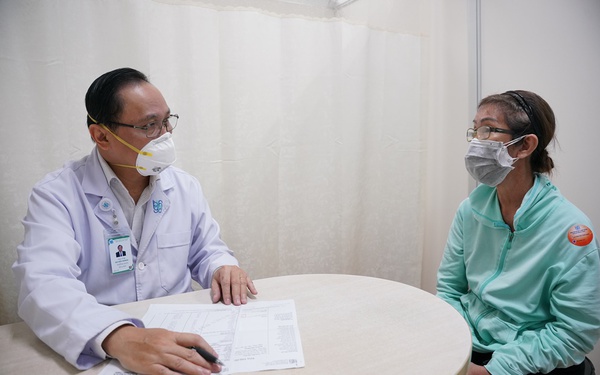What does the National Children’s Hospital’s hepatobiliary specialist note to parents to prevent ‘mysterious’ acute hepatitis in children?
According to information from the World Health Organization (WHO), as of May 10, there were 348 cases of ‘mysterious’ acute hepatitis in children in 25 countries.
In Vietnam, so far, no cases have been recorded nationwide, but in the past 2 weeks, the Ministry of Health has continuously sent documents to the Institutes of Hygiene and Epidemiology, the Pastuer Institute and localities in the country. nationwide to direct medical facilities in the area to strengthen surveillance, epidemiological analysis, sampling and testing, and promptly implement epidemic prevention measures;
Synthesize the situation of suspected cases of acute hepatitis of unknown etiology in children, immediately report suspected cases, and propose measures to prevent the spread of the disease in Vietnam to Minimize the number of children getting sick and dying
4 signs parents need to take their children to the doctor for early detection of ‘mysterious’ acute hepatitis
Dr. BS Nguyen Pham Anh Hoa – Head of the Department of Hepatology, National Hospital of Pediatrics, said that acute hepatitis is a condition in which the liver is newly damaged due to many causes such as viruses, bacteria, toxins, metabolic disorders. chemical, hemodynamic disorders, immune disorders or systemic diseases … leading to the destruction of liver cells as a result.
“Most cases of acute hepatitis are reversible after eliminating the causative agent, a few are severe, resulting in irreversible liver failure and possibly death, in some cases, disease can lead to chronic liver disease, cirrhosis … “- Dr. BS Nguyen Pham Anh Hoa said.
Dr.BS Anh Hoa, citing sources from WHO, said that acute hepatitis of unknown cause in children has some common characteristics as follows:
– Age: between 0-16 years old. Young children get sick more often. Have one or more symptoms such as fever, abdominal pain, vomiting, diarrhea, etc.
– There are symptoms of liver damage of varying degrees such as jaundice, yellowing of the eyes, pale stools, destruction of liver cells (increased levels of liver enzymes in the blood);
– No known common causes of liver damage were found;
– Patients can recover after active supportive treatment, however, in some cases, severe development causes irreversible liver failure, need liver transplant and there have been cases of death;
Parents need to pay attention to monitor their children, if children have suspicious signs such as yellowing of the skin, eyes, pale stools, lethargy, etc., they need to take the child to a medical facility for an early diagnosis. and prompt treatment.
What is the cause of the ‘mysterious’ series of acute hepatitis in children, is it due to Adenovirus or not?
The hepatobiliary specialist of the National Children’s Hospital said that the exact cause of these acute hepatitis cases has not been determined yet. Until now, in the world, the rate of liver damage causing acute liver failure of unknown cause still fluctuates in the range of 25-30%, however, these cases are quite scattered and do not appear in clusters like other cases. Hepatitis of unknown etiology is currently being discussed a lot in recent days.
There are a number of hypotheses put forward and scientists focus on researching and clarifying:
1. The association of Adenovirus, especially Adenovirus 41 strain, to the onset of acute liver injury
2. The role of causing liver damage of the SARS-CoV-2 virus (which causes COVID-19 disease)
3. The emergence of a new virus variant or not?
4. Changes and immune response of children after COVID-19 infection, as well as response to other common viruses.
According to WHO, 70% of patients in the hepatitis group of unknown etiology in the UK and 50% of cases in the US have been found to have adenovirus strain 41. This is a virus that has been discovered since 1953 with many strains and can cause disease in many organs.
The most common lesions caused by Adenovirus are respiratory tract infections, eye conjunctivitis (pink eye), cystitis, meningitis… After Rotavirus, Adenovirus is the second cause of diseases in the gastrointestinal tract with symptoms in the stomach, intestines….
In young children, common digestive disorders caused by adenovirus include diarrhea, vomiting, and nausea. According to previous studies, evidence from antibody testing suggests that most children have had at least one adenovirus infection between the ages of 0 and 4 years. In the past, there have been isolated reports of a few pediatric patients with this virus causing liver damage in immunocompromised children.
To date, there is not enough evidence to confirm that Adenovirus is the cause of disease in the group of children with acute hepatitis mentioned above, however, the recognition of the presence of Adenovirus in some pediatric patients needs to be further monitored and studied. next time.

Information on ‘mysterious’ acute hepatitis in children
Is the SARS-CoV-2 virus that causes COVID-19 the cause of the disease?
According to TS.BS Nguyen Pham Anh Hoa, so far, out of 348 cases, some children have tested positive for SARS-CoV-2 virus. There are 10-18% of sick children with evidence of co-infection with SARS-CoV-2 virus and Adenovirus.
The role of the SARS-CoV-2 virus in causing disease is not really clear and needs to be further studied.
Is the COVID-19 vaccine the cause of acute hepatitis?
Most of the sick children are young children who have not been vaccinated against COVID-19. Therefore, there is no association between the COVID-19 vaccine and acute hepatitis.
How to monitor hepatitis cases of unknown cause at National Hospital of Pediatrics?
Head of the Department of Hepatology, National Children’s Hospital, said that, under the direction of the Ministry of Health, the hospital has been strengthening surveillance of children with suspicious signs, epidemiological investigation, clinical assessment, implementation necessary tests to determine the cause, and report to epidemiological authorities and the Ministry of Health.
During this period, all patients with gastrointestinal symptoms and acute liver injury admitted to the hospital will be given special attention to their epidemiological history, gastrointestinal and extra-gastrointestinal symptoms. …after all common causes of liver damage have been ruled out, further tests will be conducted to find the cause, including screening for Adenovirus.
The recording, reporting, treatment and monitoring of new cases are strictly complied with the regulations of the epidemic prevention center and related agencies in order to minimize the number of cases and deaths.
How is acute hepatitis of unknown cause treated?
Because the cause of the disease is unknown, there is no specific treatment. Treatment measures are mainly symptomatic and supportive treatment, including aggressive resuscitation measures for severe liver failure such as plasma exchange, continuous dialysis, etc., and possibly transplantation. emergency liver.
The goal is to provide early supportive treatment for children to limit the level of damage to the lowest level and enhance the ability to restore liver function and liver transplantation in case of decompensated liver failure.
Is there a possibility that the case of acute hepatitis will appear in Vietnam?
It is entirely possible that cases of acute hepatitis of unknown cause in Vietnam will occur.
Currently, a number of Asian countries have reported cases such as Japan, Singapore, and Indonesia.
Notes for parents on prevention of acute hepatitis in children
Because to date, the cause of liver damage in this group of patients is still unknown, so it is not possible to recommend specific and active preventive measures. However, young parents should not be too alarmed. We need to be calm and attentive to be able to detect early symptoms of gastrointestinal disease and liver damage in children.
Children with symptoms of fever, abdominal pain, vomiting-nausea, diarrhea, fatigue, jaundice, conjunctivitis… should be examined at medical facilities.
While waiting for research results to confirm the cause of the disease in order to have specific measures, disease prevention should adhere to the following principles:
Practice good personal hygiene, wear a mask, wash hands often, especially before preparing food, before eating, after cleaning.
Fully immunize children according to the immunization schedule, including hepatitis B vaccine, hepatitis A vaccine, and COVID-19 vaccine when indicated.
Use clean food sources, ensure food hygiene and safety. Pay special attention to disease prevention for children in schools and kindergartens by ensuring hygiene, using separate personal items (water cups, spoons, etc.). , bowls, towels…).
Clean and disinfect surfaces well. Dispose of waste appropriately.
at Blogtuan.info – Source: cafebiz.vn – Read the original article here



